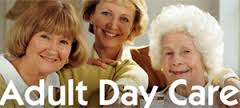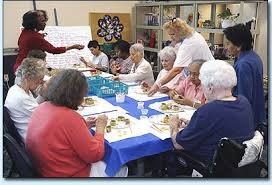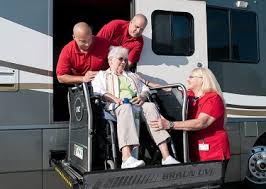Adult Day Care

Adult day care (ADC) is one of the most cost-effective provision of health care for the elderly that you can find when it's available where you live.
So, why do I say that adult day care is such a cost-effective means of providing health care to the elderly? I say that because the elderly client has the benefit of being cared for at the adult day care during the day for up to 10 hours and then goes home to be taken care of by a family member. During that 24 hour period, the client has been well cared for and at a fraction of the cost of facilities such as assisted living or nursing home care. What's more, the client is not institutionalized and has the benefit of remaining at home with his/her family. The family unit remains intact, the family caregiver gets a break from the task of care-giving and the client receives the care that has been prescribed by his/her doctor.
What is Adult Day Care?
Adult day care facilities provide daytime health care and social activities for chronically ill or impaired adults 18 years of age or older. Many adult day care facilities provide the same care that an assisted living center or a nursing home provides except for the overnight stay. These facilities are licensed by the state in which they operate and that is one of the questions that you want to ask when considering an adult day care.
These facilities are staffed by an RN and/or an LVN who are able to do medical assessments as needed, and administer any physician ordered treatments or medications, including injections.
Personal care and toileting needs are provided by experienced, caring, and dedicated staff. During their stay at the ADC, clients have the opportunity to make new friends, participate in meaningful activities organized by the Activities Director, and be regarded as individuals understanding that they continue to be a vital part of their family and the community in which they live.
The family members can preserve their daily routine of maintaining or seeking gainful employment, pursuing educational opportunities, taking care of family business, socializing or just resting and recuperating. In this way, the family unit can remain intact and costly premature institutionalization is prevented.
Most adult day care facilities call their participants, clients. This is the person who comes to the adult day care for health services or to participate in the programming, socializing and activities.
But there is another client to be considered and that is the family caregiver; after all, it is the family caregiver who calls the adult day care for services, not the person with the disability. This family caregiver is usually a woman. It may be the wife, sister, daughter or in some cases the mother. There are, of course, men who are the family caregivers also, but for the most part, it is the woman who is the caregiver, even when the participant is an in-law.
Caring for an adult with physical and/or mental disabilities is a daunting task for any caregiver. Even the most experienced caregiver working in a nursing home will tell you that they sometimes reach a point of burn out working 8 hours a
day.
Consider the single mother of a disabled adult child. She has to bathe, dress, and feed her child every day of that child’s life and also, attempt to bring some social interaction into that child’s life. Then there is a family comprised of a husband, wife, and school age children who have recently had an elderly disoriented parent move in with them. Both husband and wife work outside the home and the children go to school during the day. The elderly parent remains at home alone with no social interaction, perhaps unable to take his/her medicine as prescribed, unable to find the food that the adult children left for him/her, and possibly wandering out of the house and getting lost. The adult children worry while at work if the elderly parent is alright and many times miss work or have to quit work in order to care for the elderly parent.
This same scenario applies to an elderly couple where one of the couple suffers from dementia or Alzheimer’s. The burden of full-time care-giving falls on the lucid spouse whose stress level increases and his/her own mental, emotional and physical health is compromised and begins to suffer the consequences of caring for a loved one. This is when the caregiver needs to seek out the services of the adult day care.
Types of Adult Day Care
There are basically three types of adult day cares.
1. Medical model- The medical model is licensed by the State and provides health services prescribed by the client's physician. It is staffed by a licensed nurse and trained caregivers. The nursing staff can administer physician prescribed medications and treatments and some provide licensed rehabilitation therapy. Additionally, they provide the same services as the social and Alzheimer's model.
2. Social model- The social model does not have to be staffed by a licensed nurse and focuses primarily on social and fun activities. The seniors who attend are for the most part able to participate in social outings and other social events such as gardening or attending dances sponsored by the ADC.
3. Alzheimer's model- The Alzheimer's model focuses on clients with a diagnosis of Alzheimer's or a dementia other than Alzheimer's. The ADC has staff that are trained in communication techniques and the care of the Alzheimer's client. These facilities usually have some kind of safe and secure system on their exit doors to prevent clients from elopement. Many Alzheimer's victims are physically very capable of walking out of a facility unsupervised. Although physically capable, they probably do not have the cognitive ability to find their way back. They may not even be able to remember their own name. A door security system is a huge plus for any facility that deals with Alzheimer's clients. You would want to inquire of the ADC is they have such a security system.
What Services are Provided?

1. Nursing assessment-A nurse must be available to assess the participant in case he/she experiences a health care issue. The nurse is able to look for signs and symptoms and will check vital signs. After she has conducted a thorough assessment, she can then take appropriate action such as notifying the family caregiver, if the health issue is not an emergency. She can notify the client's physician to convey information regarding the health issue. The client's physician can then instruct the nurse accordingly. Of course, if the health issue is an emergency, the nurse can take immediate action such as performing or directing CPR and/or calling 911.
2. Personal care- Many clients of adult day care require assistance with toileting. The ADC will have trained nurse aides to provide assistance or the toileting necessary to keep the client clean and comfortable.
3. Activities/crafts/games- The ADC provides activities, crafts and games that are fun and yet designed to keep the client stimulated physically and mentally. We know from the medical literature that stimulating activities enhance cognitive abilities in the elderly and disoriented client.
4. Nutritious meals- The ADC, if licensed, is regulated by the state in which they operate. The licensing regulations require that the ADC provide nutritious meals and snacks provided under sanitary conditions and served in a timely manner.
5. Socialization with other clients, staff, visitors- Socialization with other people is one of the most important features of the ADC. Most clients have very little interaction with anyone outside of the immediate family. In many cases, the only interaction that the client may have is with the spouse for days or weeks. At the ADC, there are many other people with whom the client can interact and develop friendships.
6. A safe and healthy environment- As part of the licensing requirements, the ADC has had to go through inspections by the local fire authority as well as the State licensing agency. Both inspect the ADC prior to licensing and periodically each year, to assure the public that the facility is safe for participation.
What are the Costs?
You may have several options as far as how you can pay for the services. I don't know of any licensed adult day care facilities that provide the services for free. Operating an ADC is very expensive and it would take some deep pockets in order for an organization to be able to do that.
Most Adult Day Cares have a private pay fee which can range from approximately $40 a day to $200 dollars a day depending on the geographical location, the type and intensity of services and the amenities you get.
Many facilities are Medicaid Certified and receive reimbursement from the State Medicaid program for services provided to Medicaid eligible and medically qualified clients. Medicare does not cover adult day care, although U.S. Representative Linda Sanchez D-CA has introduced the Medicare Adult Day Services bill in Congress. It remains to be seen whether congress will support it. If you are in favor of it, you should write to your congress-person and ask them to vote in favor of it.
If the ADC has a contract with the Veterans Administration, the VA can cover the costs of the services for the veteran.
There are several long term care insurance companies that provide insurance benefits to cover adult day care. You need to check with your long term care insurance company and ask if they do and under what circumstances.
Who Benefits from Adult Day Care Services?
1. The participating client benefits from the friendships that are developed and the socialization with people outside the immediate family. The client also benefits from health care monitoring counseling by health professionals. During their stay, the clients also benefit from a nutritious and well balanced diet.
2. The family caregiver benefits by being able to maintain or seek gainful employment. If employment is not a necessity, the caregiver benefits by having a day of rest and relaxation where she can do whatever she wants without worry about her disabled family member.
3. We, the taxpayers benefit with lower health care reimbursement to nursing homes. Like it or not, we all contribute to the financial support of nursing home residents when the payer source is government subsidy such as Medicare and Medicaid. An adult day care facility is more cost-effective way of caring for the elderly.
4. The community benefits by having a health care facility that the citizens of that community can access for care of the elderly person or as a health care employer.
5. The local employers of the family caregiver benefit by having less lost time from work by their employees, enhancing the productivity of the company and the community.
Transportation

Some adult day care programs offer transportation through buses or vans which they operate on a daily basis.
Some communities have door-to-door public transportation sponsored by the local transportation authority or a local government agency for a reasonable fee.
Some communities may have a non-profit organization organized to provide transportation to medical destinations and may charge on a sliding scale fee.
For some families, however, transporting the client in the family car is the only way to get them to the facility. Most Adult day cares are open at least 10 hours a day which makes it convenient for some families to drop off their loved one on their way to work and pick them up on their way home where the family unit can remain intact and everyone can resume their routine.
If Adult Day Care is not what you are looking for, please leave this page and go back to the Home Page for other elder care options available to you.
Copyright © 2008-Present - Guide-To-Elder-Care.com - All Rights Reserved
Recent Articles
-
I STILL MATTER
Dec 23, 24 08:37 PM
I STILL MATTER As time passes on I turn the next page to discover a new me while I continue to age. I may no longer be who I was long ago but I still -
Relocating Your Elderly Parents
Jun 10, 23 05:29 PM
Relocating your elderly parents can be very difficult -
Side Jobs for Senior Caregivers
Jun 10, 23 05:03 PM
5 tips for starting a side job that will allow you to bring in income while caring for your loved one.
